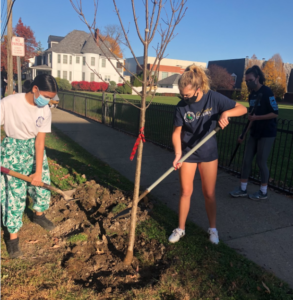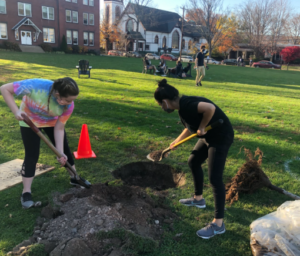Climate Science and Sustainability at Sem in Action
By Nahisha Pokhrel ’23
As COVID-19 rates rise like the ocean levels and spread fast like the Amazon wildfire, Sem students are actively masking as they plant trees around campus. The tree-planting initiative was brought to light by Sem’s new programs, Climate Science and Sustainability (CSS). The Climate Science and Sustainability program launched an academic concentration in which students spend years of research and committed focus to bring about their approach to climate science, whether it be through a business, arts, politics, or any new perspective. The CSS program focuses on taking action and helping students become aware of climate science and what they can do to help.
Moreover, it was incredible to see so many Sem students help plant trees engaged in the CSS Concentration. Bridget Dowd ‘22 claims, “My motivation to plant trees on campus, definitely, stemmed from wanting to be a part of something that would have an impact on the school even after I graduate.” Some of the trees which were planted were Japanese Tree Lilac, Red Jewel Crabapple, and Serviceberry. The trees were planted along Maple Ave, behind Carpenter Hall, and behind SRLC. These trees are beneficial when it comes to replacing aged and deteriorating trees on campus, creating more food and shelter locations for birds and other urban wildlife, providing root systems to absorb water and decrease runoff after storms, and providing shade and cooling on the Back Campus, as well as, sequester carbon for long-term storage.
While the trees came with many benefits and were beautiful, they also came with some difficulties in planting them. Most helpers agree that it was hard to measure the depth and width to dig so that the root can be in a good position, and rocks that were mixed in with the soil also gave some trouble as it got in the way. Regardless, the helpers did a great job, and the result gave a sense of fulfillment and joy. Ashley Dimen ‘21, a member of the Environmental Club, perfectly explains as she says, “After planting, it made me feel happy that I could leave something on campus that I can come back to and see years from now. This also felt like a big step in the right direction for Sem and environmentalism as it opens the door for more projects to come.” She eagerly adds, “It would be awesome to plant trees again, and maybe one day have an area for composting food scraps.” Composting food scraps sounds like a great idea; after all, tree planting is just one of the activities that CSS planned, with many more still to come.
Ultimately, tree planting is just one small step in the world crisis of climate change, but still a step big enough to bring change to the world and, most importantly, to the Sem community. Everyone from the Sem is encouraged to do their part to bring change to the climate crisis. Bridget Dowd ‘22 nicely puts it, “ I think more SEM students should consider getting involved with the Environmental Club, or the Climate Science and Sustainability Concentration because they are both passionate groups on campus that are devoted to issues on campus and in our world.” Once again, tree planting is just one step of the CSS program, with much more to come. Until then, please enjoy the beauty of the trees around campus and take a moment to thank the helpers, and think about what you can do to help the climate crisis.

